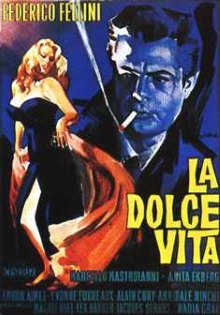
I loved each and every one of the Federico Fellini films I’ve watched so far so it’s not surprising that I had a high level of anticipation for this one. La Dolce Vita is one of the great director’s major works, coming in at three hours long. It’s also highly rated by critics. Roger Ebert notably considered it Fellini’s best film and wrote first ever review for it. Unfortunately I liked it the least of his films that I’ve seen so far. I find it great in parts but it just doesn’t add up to enough of a coherent whole for me.
The film consists of a series of vignettes about the life of Marcello Rubini, a journalist in Rome who is once again played by the fantastic Marcello Mastroianni. The stories appear to run in linear time and each is largely self-contained. The main recurring characters are Marcello himself, his long-suffering girlfriend Emma, his sometime mistress Maddalena and his photographer Paparazzo. There’s a great deal of diversity in the stories, from his glamorous encounter encounter with a Swedish-American sex symbol, an evening that he spends with his visiting father and a dinner party at his friend Steiner’s house with plenty of conversation with intellectual and artistic types. One thing you can be sure of is that Fellini always manages to work in his love of circus-like spectacles whenever possible.
All of the stories are superbly crafted but I’m not sure that I like them all. The one with Sylvia the actress is fantastic, a woman so powerful in her own sensuality that she actually overpowers Marcello. I loved how Marcello tries to seduce her Italian-style, with a slow dance and gentle whispers but then another American enters the scene and she breaks out into a whirlwind of frenzied dancing to rock and roll music, so deliciously discordant in a Fellini film. The story in which Marcello covers a supposed miracle is a well intentioned critique of religion and the scene in which the devotees tear apart a small tree in their desperation to get a piece of something which they believe have been blessed by the Madonna is an incisive one. But it’s also so blunt and predictable that it seems unworthy of the great director.
One thing that strikes me about La Dolce Vita is that while Fellini’s other films all have a measure of darkness, the best way to describe them would be that they feel bittersweet. As sad as the stories are, there are still moments of joy in them that perhaps make the darkness tolerable or even worthwhile. The messaging in La Dolce Vita on the other hand is unrelentingly nihilistic and cynical, with Steiner’s death being a particularly brutal blow about how difficult it is to find some measure of meaning in life. I’m also disappointed that the individual stories don’t tie together very well but inasmuch as it has a core, this film chronicles Marcello’s struggle between his journalistic side: crude, money-making, dominated by temporary and superficial crazes and his literary side which aspires to create great art and reach for the sublime. The final story with its vulgarity and disgusting lack of any sort of real creativity leaves one in no doubt as to which side ultimately prevails and this can’t help but leave a sour taste in the audience’s mouth as the film ends.
Still, it’s important to accord this film its proper place in cinematic history and acknowledge its cultural influence. I was confused when Marcello kept calling his photographer partner Paparazzo, thinking that it’s some kind of denigrating nickname. It was only much later that I learned that the modern use of the term paparazzi actually comes from this film. No doubt the scenes of the crowds of intrusive photographers that seem normal today must have felt inventive back in the day. Similarly I felt blasé about parties with aristocrats and tycoons who lounge around spouting angsty nonsense but perhaps those scenes had more of an impact then. Even so, whether or not the good parts are worth the three hour slog is a hard call.